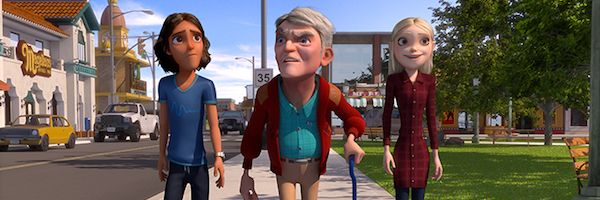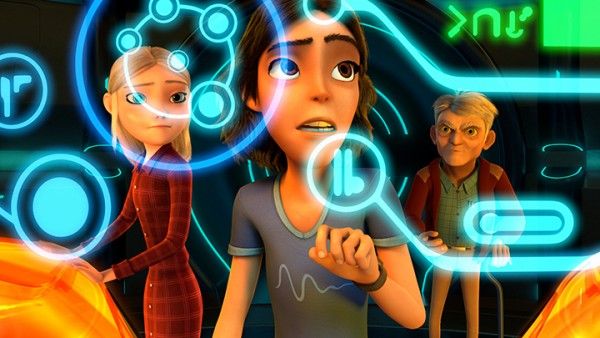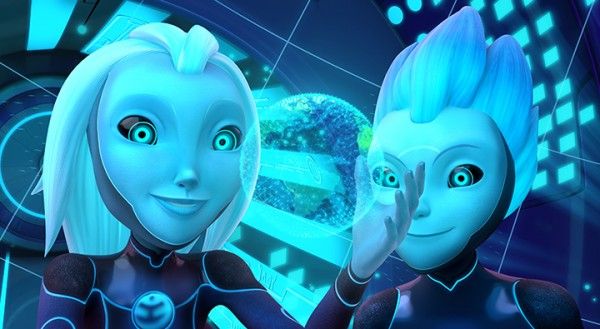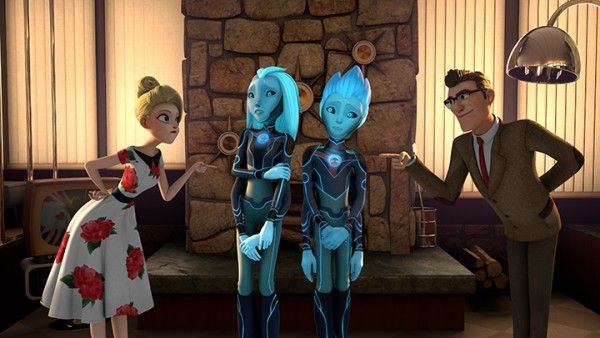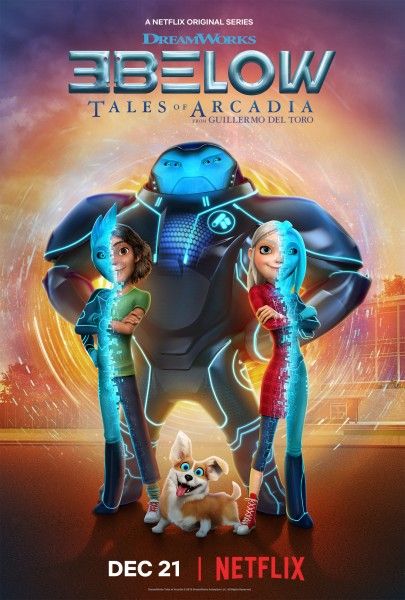Spoilers for 3Below follow ... below.
Science-fiction has always managed to tell entertaining stories while also commenting on actual world problems. From Westworld’s questions of consciousness to Ready Player One’s message of the dangers of not spending time outside, the genre has always offered more than just entertainment. At first, Guillermo del Toro’s newest installment in the Tales of Arcadia series appears to have more in common with Superman than any of the fantasy stories that inspired Trollhunters, but under the surface of 3Below lies a story of immigrants, of prejudices, and of the very idea of “home”.
As Dave Trumbore wrote in his review of the show, 3Below does suffer from a more kid-friendly humor than Trollhunters, but it’s what it does with its more mature themes that sets this show apart from its predecessor. In the first episode, after our alien protagonists land on what they call the “mud planet”, their ship’s computer chooses to hide them by transforming them into three forms that humans tend to ignore: a girl, a Latino, and a senior citizen. It’s a clever way of delivering a message without hitting you over the head with it.
Anyone familiar with the work of show co-creator, Guillermo del Toro, knows he is no stranger to using genre to tell stories with a message. Like Pan’s Labyrinth or The Devil’s Backbone, del Toro uses the Spanish Civil War as a background to contrast the fantasy horror of the film’s protagonists with the real horror and political unrest of the times. The story of a royal prince or princess being forced to flee their home and fighting to reclaim their throne is one told countless times throughout the years. What 3Below does so well is taking that familiar fish-out-of-water story and mixing it with the very real immigration experience. During the first couple of episodes, we see Aja and Krel struggling to fit in at their new school and, really, to comprehend basic human traditions.
Many of the younger audience members will find it funny to see Aja and Krel act baffled when asked for money at a store, or when a cop asks them if they even know what a school is. The show uses the reactions from the town’s citizens for comedic effect, even if it's ridiculous that everyone is so willing to accept that these two kids have somehow never even heard of the concept of money or a school. 3Below uses this disconnect to show something every immigrant is familiar with, the endless “Don’t they have X where you’re from?” jokes. It’s a simple thing that may easily go over the audience’s heads, but it also shows how quick some people are to dismiss other cultures and places as "less than" their own.
So goes the rest of 3Below, where its target audience may miss most of its winks and nods at current issues, but where older viewers may find something worth discussing. The best example is Episode 7 “Escape Plan” where, after being attacked by an alien bounty hunter the night before, Aja and Krel are called to the principal’s office by a special advisor for the school board. The advisor then drops a literal tower of papers into Aja’s and Krel’s hands so they can register at the school. What are the forms, you ask? Nothing but your standard report cards and attendance records from other schools, and also birth certificates, immunization histories, cell phone bills and text message history. And of course, proof of residency. All to be filled by the end of the same day. This is played for the sight gag of the mountain of papers getting taller and taller, but even the principal, Señor Uhl, realizes how ludicrous a requirement it is; it's a small but impactful way of showing the difficult process of legal immigration. By the end of the episode, we find out the school advisor was in fact an alien bounty hunter in disguise, using the paperwork to find the address of Aja and Krel to kill them. With this, the show makes the political message feel less like a detour and more like an actual part of the plot.
Kids’ animated shows don’t always shy away from heavy subjects, but the subject of immigration is one that isn’t so prominently portrayed in this type of show, and even less so in the way 3Below does it. Not content with portraying one aspect of the immigrant experience, the second show in the Tales of Arcadia series shows how there isn’t just one immigrant story. There’s the more obvious use of “alien” to refer both extraterrestrial life and also undocumented people. But then once Aja and Krel tell the story of how they were forced to flee their war-torn land after a military coup, the German-accented Spanish teacher Señor Uhl seems to perfectly understand their situation and is sympathetic to them, calling to mind that you don’t need to come from an “underdeveloped country” to be forced to flee your home, as many Europeans did after World War II. Series co-creator and executive producer, Marc Guggenheim says they always wanted to portray the universal aspect of immigration.
“The way we approached this was, everyone is an immigrant in some way. Even if you don’t move to another country, everyone, specially kids and teenagers, are always struggling with fitting in. The immigration story is ultimately a story about fitting in and how much you assimilate and retain of your own identity, how much of yourself do you show to the world.”
Because of the lengthy process of making an animated show, 3Below was written well before news of family separation at the border and the immigrant caravan became big headlines, which shines a different light on some of the allegories of the show. This is especially true in Episode 10 “The Arcadian Job”, in which our alien heroes must break into a military base to find a special piece of equipment from a detained alien ship. We see the facility guarded by tight security protocols and heavily armed soldiers, and inside is a big alien being experimented on. The show uses the idea of an Area-51 type of facility that is designed to treat alien visitors mercilessly and with the utmost prejudice, with the excuse of preventing an invasion on Earth, to show how the U.S. treats its southern border.
Today’s headlines shine a different light on the episode, however. The soldiers guarding the facility now remind us of the thousands of troops who were stationed at the border, and the big and harmless alien being imprisoned now reminds us of the thousands of immigrant children being separated from their parents when entering the country. Then there’s the scene towards the end of the episode where the woman in charge of the military base tells of previous invaders she saved Earth from. “Invaders? You don’t know why those lifeforms came here,” Aja replies. It’s a throwaway line that takes an entirely different meaning with the reactions by U.S. officials to the caravan.
Just as 3Below shows the macro problems surrounding immigration and our treatment of immigrants, so does it do a good job at showing the issues at a micro level, in the form of personal biases and prejudices. Whether it's Krel calling humans underdeveloped or stupid because we’re not as technologically advanced, or adults calling Krel out for "cheating" in math class because he’s smarter than the rest of his peers because “Someone this new to our country should not be that good at math,” or that his “kind” aren’t usually good at math, the show portrays the smaller ways immigrants face discrimination wherever they go. In a more tongue-in-cheek way, the show even gives local bully Steve prejudices against aliens, in the form of a fear that they will suck out his brain through his face and probe him, while subtly making him realize not all aliens are bad thanks to his new crush.
3Below doesn’t go as deep into political commentary as some would like, and the way in which most of its allegories are portrayed are definitely goofier than Trollhunters, but there’s no denying that the show gives us a portrayal of the immigrant experience we don’t really see in children’s entertainment. As Guggenheim tells us, his intention as not to preach a particular point of view, but to raise question and spark a conversation. There is no doubt that 3Below accomplishes just that.

